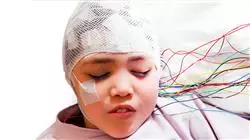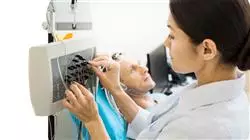University certificate
The world's largest faculty of medicine”
Introduction to the Program
Be the most reputable doctor thanks to the advanced knowledge in electroencephalography that you will acquire in this program"

Being a reliable, safe and painless method, electroencephalograms have become widespread in the clinical setting for the diagnosis of all types of brain-related pathologies. The main one is epilepsy, although it is also used to detect brain tumors or various sleep disorders.
Electroencephalography has undergone constant evolution, because despite being a method of some antiquity, it has not ceased to be used and improved, which obliges medical professionals to continuously update their knowledge in this field. For this reason, TECH Global University brings together in this Postgraduate diploma the most current and up-to-date knowledge of electroencephalography, so that the medical professional has access to the best possible teaching material on the subject.
Thanks to this degree, the student will be able to accurately record and analyze brain electrogenesis, as well as to know the most accurate Neurophysiologic techniques when detecting and treating epilepsy and different sleep disorders. All this in 3 teaching modules with a wide range of
Due to the 100% online modality, students are able to combine this program with their other professional or personal responsibilities. Since TECH does not require attendance to classes, it is the student himself who decides when, how and where to take on the entire course load of the program.
Expand your brain diagnostic methodology and become a reference in the medical landscape thanks to your knowledge in electroencephalography"
This Postgraduate diploma in Encephalography and Neurophysiologic Study of Sleep contains the most complete and up to date scientific program on the market. The most important features include:
- The development of case studies presented by medical experts in electroencephalography
- The graphic, schematic and eminently practical contents with which it is conceived provide scientific and practical information on those disciplines that are essential for professional practice
- Practical exercises where self-assessment can be used to improve learning
- Its special emphasis on innovative methodologies
- Theoretical lessons, questions to the expert, debate forums on controversial topics, and individual reflection assignments
- Content that is accessible from any fixed or portable device with an Internet connection
Enroll now in this Postgraduate diploma and don't wait any longer for that future you envision as a prestigious doctor”
The program’s teaching staff includes professionals from the sector who contribute their work experience to this training program, as well as renowned specialists from leading societies and prestigious universities.
The multimedia content, developed with the latest educational technology, will provide the professional with situated and contextual learning, i.e., a simulated environment that will provide immersive training programmed to train in real situations.
The design of this Program focuses on Problem-Based Learning, by means of which the professional will have to try to solve the different situations of Professional Practice, which will be posed throughout the Program. For this purpose, the student will be assisted by an innovative interactive video system created by renowned and experienced experts.
TECH Global University supports you on your way to the greatest medical fame with the most reputable professionals in the industry"

The Postgraduate diploma in Encephalography and Neurophysiologic Study of Sleep will be the key that will open the door to the management positions you aspire to"
Why study at TECH?
TECH is the world’s largest online university. With an impressive catalog of more than 14,000 university programs available in 11 languages, it is positioned as a leader in employability, with a 99% job placement rate. In addition, it relies on an enormous faculty of more than 6,000 professors of the highest international renown.

Study at the world's largest online university and guarantee your professional success. The future starts at TECH”
The world’s best online university according to FORBES
The prestigious Forbes magazine, specialized in business and finance, has highlighted TECH as “the world's best online university” This is what they have recently stated in an article in their digital edition in which they echo the success story of this institution, “thanks to the academic offer it provides, the selection of its teaching staff, and an innovative learning method aimed at educating the professionals of the future”
A revolutionary study method, a cutting-edge faculty and a practical focus: the key to TECH's success.
The most complete study plans on the university scene
TECH offers the most complete study plans on the university scene, with syllabuses that cover fundamental concepts and, at the same time, the main scientific advances in their specific scientific areas. In addition, these programs are continuously being updated to guarantee students the academic vanguard and the most in-demand professional skills. In this way, the university's qualifications provide its graduates with a significant advantage to propel their careers to success.
TECH offers the most comprehensive and intensive study plans on the current university scene.
A world-class teaching staff
TECH's teaching staff is made up of more than 6,000 professors with the highest international recognition. Professors, researchers and top executives of multinational companies, including Isaiah Covington, performance coach of the Boston Celtics; Magda Romanska, principal investigator at Harvard MetaLAB; Ignacio Wistumba, chairman of the department of translational molecular pathology at MD Anderson Cancer Center; and D.W. Pine, creative director of TIME magazine, among others.
Internationally renowned experts, specialized in different branches of Health, Technology, Communication and Business, form part of the TECH faculty.
A unique learning method
TECH is the first university to use Relearning in all its programs. It is the best online learning methodology, accredited with international teaching quality certifications, provided by prestigious educational agencies. In addition, this disruptive educational model is complemented with the “Case Method”, thereby setting up a unique online teaching strategy. Innovative teaching resources are also implemented, including detailed videos, infographics and interactive summaries.
TECH combines Relearning and the Case Method in all its university programs to guarantee excellent theoretical and practical learning, studying whenever and wherever you want.
The world's largest online university
TECH is the world’s largest online university. We are the largest educational institution, with the best and widest online educational catalog, one hundred percent online and covering the vast majority of areas of knowledge. We offer a large selection of our own degrees and accredited online undergraduate and postgraduate degrees. In total, more than 14,000 university degrees, in eleven different languages, make us the largest educational largest in the world.
TECH has the world's most extensive catalog of academic and official programs, available in more than 11 languages.
Google Premier Partner
The American technology giant has awarded TECH the Google Google Premier Partner badge. This award, which is only available to 3% of the world's companies, highlights the efficient, flexible and tailored experience that this university provides to students. The recognition as a Google Premier Partner not only accredits the maximum rigor, performance and investment in TECH's digital infrastructures, but also places this university as one of the world's leading technology companies.
Google has positioned TECH in the top 3% of the world's most important technology companies by awarding it its Google Premier Partner badge.
The official online university of the NBA
TECH is the official online university of the NBA. Thanks to our agreement with the biggest league in basketball, we offer our students exclusive university programs, as well as a wide variety of educational resources focused on the business of the league and other areas of the sports industry. Each program is made up of a uniquely designed syllabus and features exceptional guest hosts: professionals with a distinguished sports background who will offer their expertise on the most relevant topics.
TECH has been selected by the NBA, the world's top basketball league, as its official online university.
The top-rated university by its students
Students have positioned TECH as the world's top-rated university on the main review websites, with a highest rating of 4.9 out of 5, obtained from more than 1,000 reviews. These results consolidate TECH as the benchmark university institution at an international level, reflecting the excellence and positive impact of its educational model.” reflecting the excellence and positive impact of its educational model.”
TECH is the world’s top-rated university by its students.
Leaders in employability
TECH has managed to become the leading university in employability. 99% of its students obtain jobs in the academic field they have studied, within one year of completing any of the university's programs. A similar number achieve immediate career enhancement. All this thanks to a study methodology that bases its effectiveness on the acquisition of practical skills, which are absolutely necessary for professional development.
99% of TECH graduates find a job within a year of completing their studies.
Postgraduate Diploma in Encephalography and Neurophysiological Sleep Study
Encephalography (EEG) and neurophysiological sleep study are medical tests used to evaluate electrical activity in the brain and a patient's sleep patterns, respectively. Encephalography is a painless test that measures the electrical activity of the brain by recording brain waves on the scalp. It is used to diagnose a variety of neurological disorders, such as epilepsy, encephalopathy, meningitis, head trauma, down syndrome, among others. The neurophysiological sleep study, also known as polysomnography, is a medical technique used to evaluate the different stages of sleep and the patient's state of alertness. This test is performed in a sleep laboratory and records brain activity, muscle activity, breathing and eye movements during sleep. It is used to diagnose sleep disorders such as sleep apnea, restless legs syndrome and various mood disorders.
Both EEG and neurophysiological sleep study are important tests in neurology and sleep medicine. Both techniques provide valuable information for the diagnosis and treatment of neurological diseases and sleep disorders. Accurate diagnosis of these pathologies helps to ensure proper medical care and improve the quality of life of patients. The objective of this Postgraduate Diploma program in Encephalography and Neurophysiological Study of Sleep, taught online, is to provide students with an in-depth knowledge of the fundamentals and techniques of sleep neurophysiology and its relationship to the human brain. Students will learn to work with technologies such as EEG, polysomnography and actigraphy to analyze brain activity in relation to sleep.







